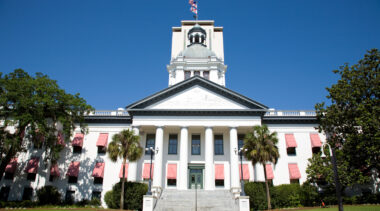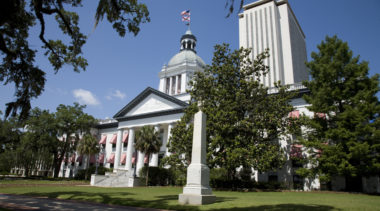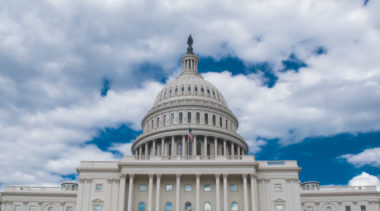Adrian Moore, Ph.D., is vice president of policy at Reason Foundation.
Moore leads Reason's policy implementation efforts and conducts his own research on topics such as privatization, government and regulatory reform, air quality, transportation and urban growth, prisons and utilities.
Moore, who has testified before Congress on several occasions, regularly advises federal, state and local officials on ways to streamline government and reduce costs.
In 2008 and 2009, Moore served on Congress' National Surface Transportation Infrastructure Financing Commission. The commission offered "specific recommendations for increasing investment in transportation infrastructure while at the same time moving the Federal Government away from reliance on motor fuel taxes toward more direct fees charged to transportation infrastructure users." Since 2009 he has served on California's Public Infrastructure Advisory Commission.
Mr. Moore is co-author of the book Mobility First: A New Vision for Transportation in a Globally Competitive 21st Century (Rowman & Littlefield, 2008). Texas Gov. Rick Perry said, "Speaking from our experiences in Texas, Sam Staley and Adrian Moore get it right in Mobility First." World Bank urban planner Alain Bartaud called it "a must read for urban managers of large cities in the United States and around the world."
Moore is also co-author of Curb Rights: A Foundation for Free Enterprise in Urban Transit, published in 1997 by the Brookings Institution Press, as well as dozens of policy studies. His work has been published in the Wall Street Journal, Los Angeles Times, Boston Globe, Houston Chronicle, Atlanta Journal-Constitution, Orange County Register, as well as in, Public Policy and Management, Transportation Research Part A, Urban Affairs Review, Economic Affairs, and numerous other publications.
In 2002, Moore was awarded a World Outsourcing Achievement Award by PricewaterhouseCoopers and Michael F. Corbett & Associates Ltd. for his work showing governments how to use public-private partnerships and the private sector to save taxpayer money and improve the efficiency of their agencies.
Prior to joining Reason, Moore served 10 years in the Army on active duty and reserves. As an noncommissioned officer he was accepted to Officers Candidate School and commissioned as an Infantry officer. He served in posts in the United States and Germany and left the military as a Captain after commanding a Heavy Material Supply company.
Mr. Moore earned a Ph.D. in Economics from the University of California, Irvine. He holds a Master's in Economics from the University of California, Irvine and a Master's in History from California State University, Chico.
-
An Overview of Mileage-Based User Fees: A Potential Replacement for the Fuel Tax
Road usage charges should replace fuel taxes, not supplement them.
-
The Challenges and Opportunities Ahead For U.S. Infrastructure
Why Congress and state governments have struggled to properly prioritize and pay for infrastructure projects and what can be done to change that.
-
Instead Of Tax Increases, President Biden Should Cut Spending And Use Public-Private Partnerships
Infrastructure projects that are paid for by users, not by federal taxes, can be a big boost to the economy.
-
Don’t Buy the Myth that the Florida Retirement System Is Fine
FRS had an unfunded liability of $36 billion as of last year.
-
COVID-19 Pandemic Reveals the Need for Nursing Home and Certificate of Need Law Reforms
The evidence indicates that certificate of need laws may actually be counterproductive to the goals of reducing costs and improving quality.
-
Social Media Companies Have the Right to Ban Users
Twitter and Facebook are free to ban whomever they want, even the president, and it should stay that way.
-
Florida’s Response to COVID-19 Shows How It Could Address the Looming Physician Shortage
Lawmakers should consider permanent reforms to allow out-of-state health care professionals to more easily practice in Florida and embrace the potential of technological innovations.
-
Analysis of Florida’s 2020 Ballot Measure Results
Florida voters gave their verdict on six statewide ballot initiatives.
-
Voters Across the Country Decriminalize Drugs, Reject Failed War on Drugs
These shifts away from the failed War on Drugs to an evidence-based harm reduction approach are important and positive steps.
-
Could a Federal Loan Program Help Fix Ailing State Public Pension Plans?
Federal loans for states with failing pension systems would penalize states that have taken steps to address insolvency and are unlikely to fix the worst-off public pension plans.
-
Florida’s Public Pension Investment Return Assumptions Are Too Risky and Driving Debt
Unrealistic investment return assumptions have been the largest contributor to the $30.3 billion in unfunded pension liabilities the Florida Retirement System has accumulated since 2008.
-
It’s More Important Than Ever to Let Education Funding Follow Kids
A massive crisis like the coronavirus pandemic is not the time to limit options for families struggling to find a way to balance their health, kids’ educations and parents’ careers.
-
Police Reforms to Reduce the Use of Force and Increase Accountability
Demilitarizing the police, ending asset forfeiture, and adding transparency and accountability are the first steps in reforming the police.
-
Cities and States Need to Better Share Testing, Tracing, and Coronavirus Risk Information With Public
Sharing more comprehensive information on testing and areas with positive tests would help make citizens confident they can safely resume activities while continuing to take appropriate actions to manage risks.
-
The Length of the Recession and Economic Recovery Could Still Come In A Variety of Forms
This coronavirus pandemic-related economic contraction is unusually hard-hitting on some industries and seems to be digging a bigger, rather than a deeper, hole in economic growth.
-
COVID-19 Crisis Shows Governments and Private Companies Spent a Decade Being Fiscally Irresponsible
We pretended the economy would never experience another shock, downturn or recession.
-
President Trump and Federal Agencies Botched Initial Coronavirus Response — Bailouts Will Make It Worse
Private businesses should not be operating under the premise that in a financial downturn, or even a crisis, they’ll quickly be bailed out by the federal government.
-
Florida Sheriffs Association Is Wrong About Criminal Justice Reforms
The Florida Sheriffs Association attacks the idea of rehabilitation of offenders and argues that only punishment and longer sentences work.


















